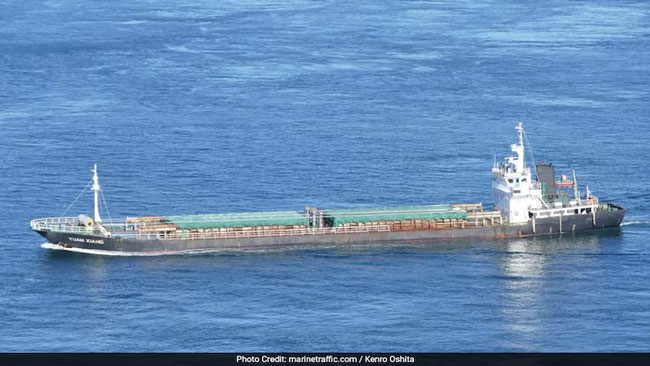Desk:In a historic development, a Pakistani cargo ship has docked at Bangladesh’s Chittagong port for the first time in over five decades. This marks the resumption of direct maritime contact between the two nations, signaling a significant shift in their relationship, which has been strained since the 1971 Bangladesh Liberation War.
The Arrival of the Pakistani Cargo Ship
The Panama-flagged container ship, Yuan Xiang Fa Zhan, measuring 182 meters (597 feet) in length, arrived at Chittagong on November 11, 2024. It had sailed from Karachi, Pakistan, carrying a range of goods, including raw materials for Bangladesh’s vital garment industry and basic food items. This shipment is part of a broader effort to promote trade between Pakistan and Bangladesh, as the ship unloaded its cargo at the southeastern port of Bangladesh.
Previously, Pakistani goods had been transshipped via third-party ports, such as Sri Lanka, Malaysia, or Singapore, before reaching Bangladesh. This was primarily due to stringent import regulations, including mandatory physical inspections on arrival, which caused delays. However, in September 2024, Bangladesh’s interim government, led by Muhammad Yunus, eased some of these restrictions, facilitating smoother trade between the two nations.
Implications for Pakistan-Bangladesh Relations
This direct shipping link between Pakistan and Bangladesh is seen as a strategic move by Bangladesh’s interim government to foster closer economic ties with Pakistan. The maritime route is expected to open new opportunities for businesses on both sides, enhancing bilateral trade and cooperation in various sectors.
The opening of the route has generated widespread attention on social media, with Pakistan’s ambassador to Bangladesh, Syed Ahmed Maroof, calling it “a major step” toward boosting trade. He emphasized that the direct shipping link would promote new opportunities for businesses in both nations.
The Shadow of 1971 and Political Shifts
The resumption of maritime contact comes after decades of strained relations, rooted in the 1971 Bangladesh Liberation War, which led to Bangladesh’s independence from Pakistan. The war, which saw the killing of millions and widespread atrocities, remains a painful memory for many Bangladeshis. Since then, diplomatic relations between Pakistan and Bangladesh have remained tense, especially under the leadership of Sheikh Hasina.
Hasina’s administration has focused on seeking justice for war crimes committed by Pakistan during the conflict, including setting up the International Crimes Tribunal (ICT) in 2010 to prosecute individuals involved in atrocities. Additionally, her government banned the pro-Pakistan Jamaat-e-Islami party, further straining ties between the two countries.
Shift in Bangladesh’s Politics
After the ousting of Sheikh Hasina from power, Bangladesh’s interim government, led by Yunus, has sought to repair relations with Pakistan. Yunus, who previously advocated for closer cooperation with Pakistan, expressed his desire to turn a “new page” in their bilateral relations, focusing on economic collaboration and regional stability.
In recent months, there have been increasing signs that Bangladesh may be shifting its political alignment, including calls to revise the country’s constitution by removing the terms “socialism” and “secularism,” which could signal a move toward a more Islamic-oriented state.
Impact on India
The warming ties between Pakistan and Bangladesh come at a sensitive time for India, particularly given Bangladesh’s geographical proximity to India’s northeastern states. New Delhi has long been concerned about the potential security risks posed by increased cooperation between Islamabad and Dhaka, especially due to Pakistan’s involvement in regional destabilizing activities, including narcotics trade and support for insurgent groups.
Historically, India has maintained close ties with Bangladesh, especially under Hasina’s leadership, which facilitated cooperation in various fields, including counterterrorism. However, with the current political shift in Dhaka, India’s security concerns may deepen, particularly regarding the potential for Pakistan’s Inter-Services Intelligence (ISI) to gain influence in Bangladesh’s political landscape.
Outlook for Bangladesh-Pakistan Relations
The direct maritime connection is just one of several steps in a broader effort by Yunus’ interim government to strengthen ties with Pakistan. At the United Nations General Assembly in September 2024, Yunus and Pakistani Prime Minister Shehbaz Sharif discussed enhancing bilateral cooperation. Yunus has reiterated that it is essential for both countries to work together on matters of trade, security, and regional cooperation.
Despite these efforts, the political climate in Bangladesh remains volatile, with ongoing protests and social unrest. The government has issued an arrest warrant for former Prime Minister Hasina, accusing her of involvement in crimes against humanity, which has further strained relations with India.
While the resumption of direct maritime trade between Pakistan and Bangladesh is a significant step toward improving bilateral relations, the situation remains complex. Both nations are working to rebuild ties after decades of animosity, but the legacy of the 1971 Liberation War, internal political challenges in Bangladesh, and India’s security concerns continue to shape the broader geopolitical dynamics of the region.




